| Srl | Item |
| 1 |
ID:
161633
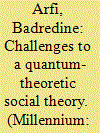

|
|
|
|
|
| Summary/Abstract |
A key claim that Alexander Wendt makes in his book Quantum Mind and Social Science: Unifying Physical and Social Ontology is that he is not using the ‘quantum’ as a metaphor. Nor is he drawing analogies either. He argues that he is constructing a quantum theory of the human subject and social structures through a quantum-theoretic explanation of consciousness undergirded by a panpsychist hypothesis of primitive proto-consciousness. In this article I show how Wendt’s insistence that he is developing a literally-speaking quantum-theoretic approach presents him with a number of must-not-ignore challenges that originate in quantum theory. I specifically discuss three challenges:
|
|
|
|
|
|
|
|
|
|
|
|
|
|
|
|
| 2 |
ID:
099497
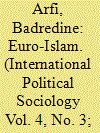

|
|
|
|
|
| Publication |
2010.
|
| Summary/Abstract |
Is a "Euro-Islam" possible? Whether at the level of theory, practice or policy, very few scholars and practitioners pay enough sustained attention to the fact that how we think/not-think, speak/silence, inscribe/erase, and address/ignore various aspects of "Islam in Western Europe" has much to do with the concepts of "identity" and "other." Whereas policy-makers, activists, peace-advocates, and fear-mongers continuously deploy these concepts for or against certain strategies, agendas and purposes, it is important to "deconstruct" these concepts so as to open up a horizon for thinking the possibility of a Euro-Islam. This paper thus argues that thinking of Euro-Islam implies an aporiatic politics of "Othering" and that it is possible to go beyond this aporia in a certain way by using a new approach for thinking about Islam in Europe. I develop this framework through a deconstruction of the concepts of "identity" and "other" using a non-Aristotelian logic of "without," the pair of undecidable concepts immunity/auto-immunity, and Derrida's notion of "negotiation."
|
|
|
|
|
|
|
|
|
|
|
|
|
|
|
|
| 3 |
ID:
101473
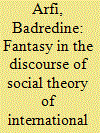

|
|
|
|
|
| Publication |
2010.
|
| Summary/Abstract |
No doubt Wendt's 'Social Theory of International Politics' (STIP) is a discourse. As such, the theory is built on certain discursive conditions of possibility. Drawing on Lacan's theory of discourse, I analyse these conditions of possibility in arguing that a desire of discursive closure is created in STIP through a fantasy. The latter sustains itself not only by pre-empting its own failure but also by maintaining the desire for discursive closure. I argue that STIP cannot escape deploying such a fantasy. More broadly, what social constructivism based on critical realism does, especially in its thin version, is construct a dichotomy between intransitive and transitive objects in its theoretic discourses. It then endeavours, via constructing fantasies, to use transitive discursive objects to sustain the desire for the constructed dichotomies, which hankers for discursive closure. This means that Wendt is more constructivist than he knows, despite his move of 'not going all the way down'. In short, I argue that 'ideas not all the way down' is a discourse all the way down because of what Wendt and thin constructivists struggle to make of it.
|
|
|
|
|
|
|
|
|
|
|
|
|
|
|
|
| 4 |
ID:
161630
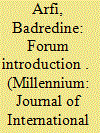

|
|
|
|
|
| Summary/Abstract |
Alexander Wendt’s Quantum Mind and Social Science: Unifying Physical and Social Ontology proposes a re-reading of many subjects and topics that have concerned IR theory over the last two decades through the quantum world and word. This book is situated quite uneasily in IR Theory: it touches upon many themes of IR theory while it understands itself to be situated beyond IR’s confines. Alexander Wendt readily admits that this book is more a treatise in social theory than ‘IR’ and he suggests that a third book will deal with ‘IR proper’.1 One could even say that this new book by Wendt is not even about a social theory of international politics as defined in his 1999 first – then groundbreaking – book. This book is about the philosophy of science and beyond … much beyond, even if the book does not always announce it as such.
|
|
|
|
|
|
|
|
|
|
|
|
|
|
|
|
| 5 |
ID:
117841
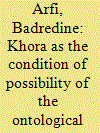

|
|
|
| 6 |
ID:
068732
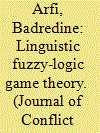

|
|
|